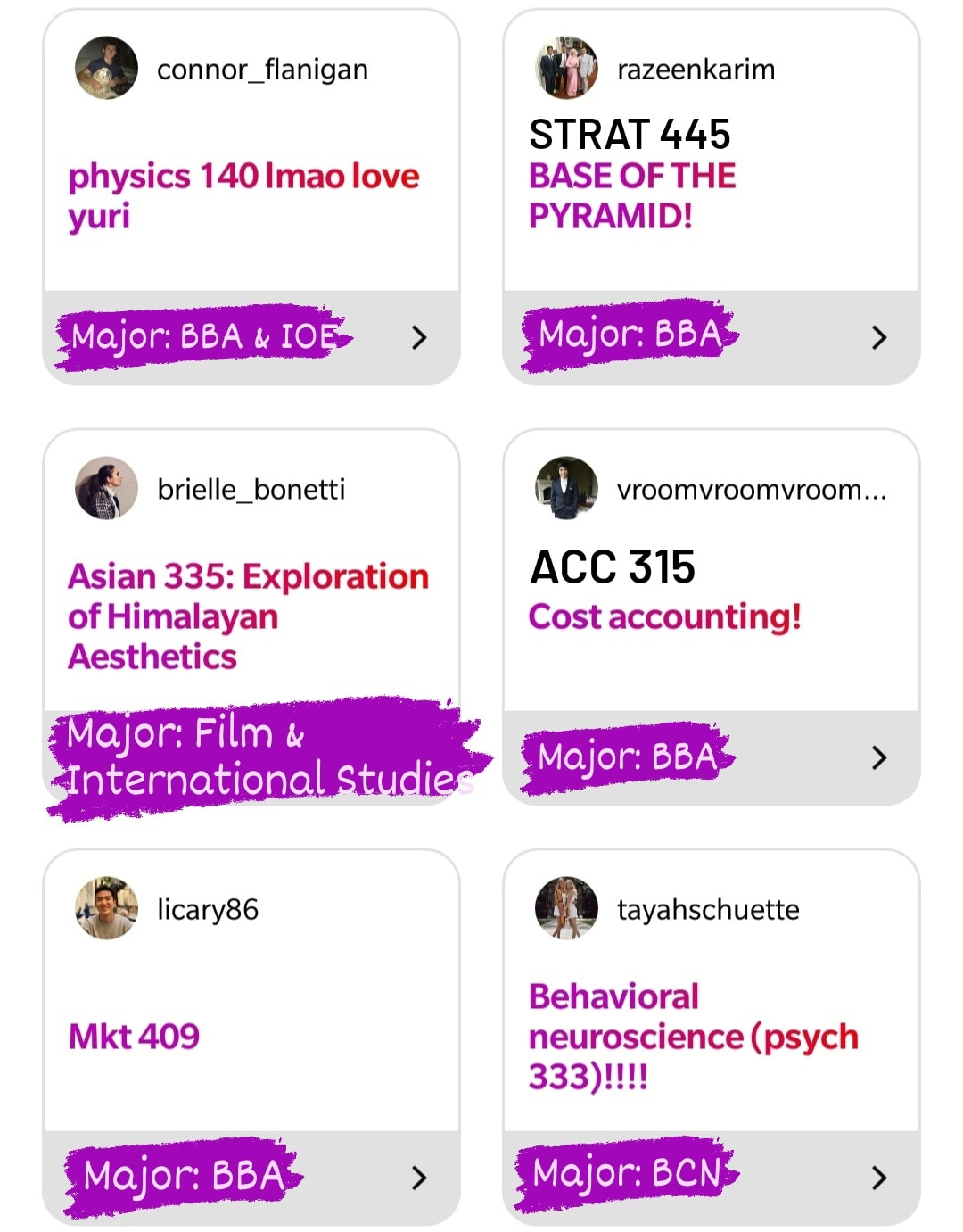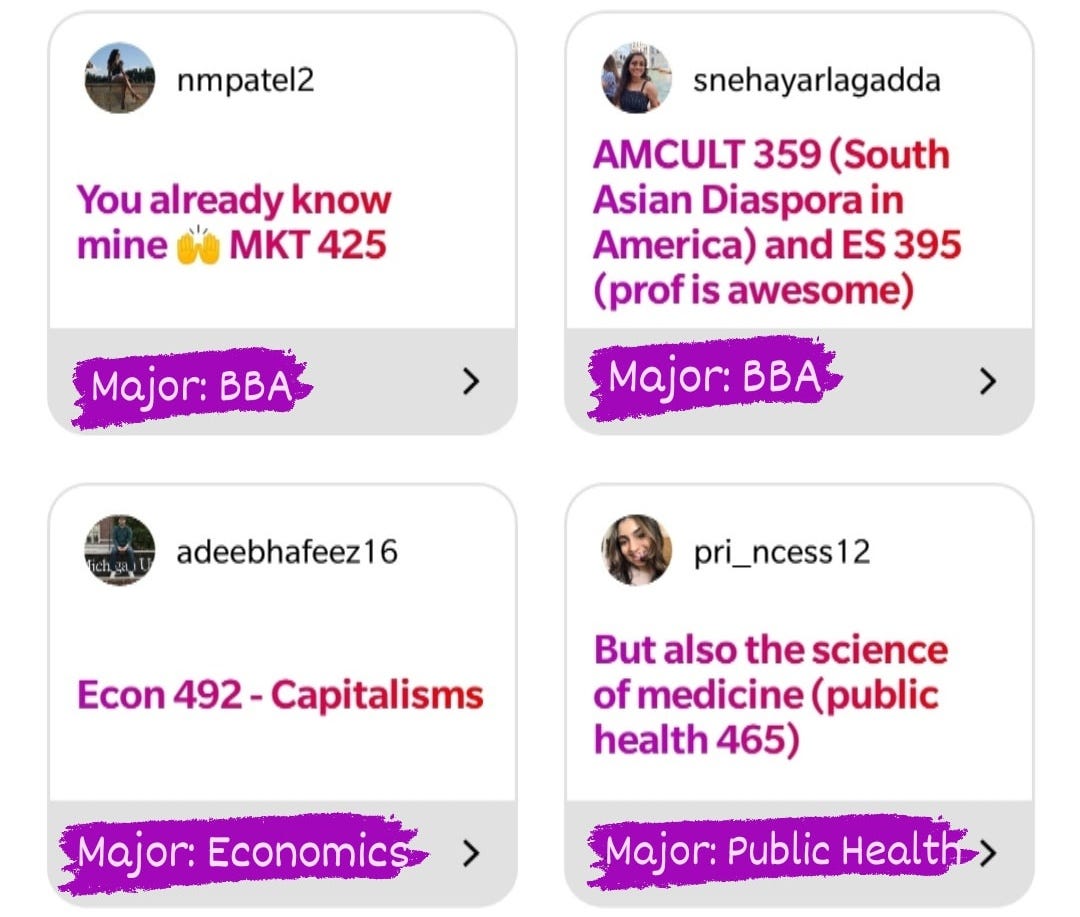I graduated from Michigan earlier this year with a dual degree from the Ross School of Business and the School of Information. I took over 45 courses during my four years with the ones listed below being my favorite. The reviews are based on my experience from 2016-2020, so some of the courses may have changed since then. I remember spending hours trying to narrow down courses, so I hope this makes your decision process easier! Share this with your friends if you find this helpful :)
#10 ES 444: Finance for Societal Good with Michael Gordon (3 credits | Workload: Low)
Overview: If you’re interested in learning how money can be used to do good as opposed to just make profits, this course is for you. It was great to hear about the impactful ways finance can be used through impact investing, microfinance, etc especially since I had minimal knowledge about these areas prior to taking this course.
Highlights: I felt like this course covered topics that aren’t discussed much at Ross, which is why I found it to be valuable. There’s a final group paper where you get grouped by topic preference, so you could choose to be in a group with your friends. Michael was really helpful during his office hours especially with helping us think through the final paper.
Things to consider: There are a lot of different topics covered so sometimes the transitions between topics weren’t the most seamless. There’s a lot of great readings/articles Michael outlines in the syllabus for each week. You can get through the course without reading all of them, but I’d recommend reading them/taking notes on topics you find most interesting to get the most out of this class.
#9 MKT 450: Customer Experience Value Creation with Venkat Ramaswamy (1.5 credits | Workload: Low)
Overview: This course discusses interactive value creation and why it’s critical for enterprises to focus on experience innovation. You analyze and reflect on how various companies have been successful in these areas. Professor Ramaswamy has deep knowledge in this space and has advised/executed projects for a multitude of corporations on this topic.
Highlights: The core content covered in the class is super interesting with real case studies explaining how companies innovate to create value for their consumers. Personally, I enjoyed the final project the most because it effectively allowed us to apply our learnings with freedom of topic and group member choice.
Things to consider: When I took the class it was one 3 hour session each week, which felt really long and made it difficult to focus for the entire duration. The content is interesting, but the class itself often felt unorganized with no clear transitions between topics. Would recommend taking it with a friend.
#8 EDUC 333: Video Games & Learning with Barry Fishman (3 credits | SS & SI distribution | Workload: High)
Overview: The current education system is far from perfect. This course explains how to design a more engaging learning environment … by having you play and analyze a video game of your choice! This is a gamified course, which means you can choose which assignments you want to (or don’t want to) complete. You know upfront how many points are needed for each letter grade. Once you accumulate enough points to achieve a letter grade, you can stop doing more assignments.
Highlights: Freedom of choice for video games, assignments, participation, and group members. This course counts towards both School of Information and Social Science credits.
Things to consider: The course did involve a lot of writing even though you could choose your assignments. Taking the course with Barry was great because I didn’t feel like I was doing a ton of ‘busy work’ like a lot of my other School of Information classes, but I’m not sure about other professors. Barry also does a lot of research in this space so listening to him was always interesting.
#7 SI 360: Succeeding at Failing with Walt Borland (3 credits | Workload: Medium)
Overview: Most entrepreneurship courses aim to have you create a product or idea by the end of the semester. However, in this course, Walt aims to instill an entrepreneurial mindset, which you can then use at any point in your life. The course really tries to help you embrace failure and allows you to make more risky decisions that you wouldn’t in other courses. This is a gamified course, allowing you to choose which assignments you want to complete. Gathering 50% of the available points gets you an A in the course.
Highlights: I felt like each assignment was well thought out and allowed me to apply learnings from the class effectively with a lot of freedom of choosing what company/topic we wanted to present on. Walt also takes the entire class out for activities (fully sponsored) - we went bowling and also got food at bdubs!! Freedom of choice is great - even in group assignments, you can choose how much responsibility you want to take (eg. you’ll get more points if you choose to be the group leader).
Things to consider: You can accumulate a lot of points through the reading reports though these aren’t mandatory. The books available are a considerable length (eg. Am I Being Too Subtle, The Four, etc), but you don’t have to read the entire book cover to cover to write the report. Make sure you stay on top of the assignments early on and understand the submission guidelines because you often have to submit your assignments within a certain window or month.
#6 Zell Early Stage Fund with Erik Gordon (BBA only | 6 credits over 2 years & Ross senior capstone | Workload: Medium)
Overview: The best course to get hands-on venture capital investing experience as an undergraduate. This is a selective BBA-only two-year course where you get credit second semester junior and senior year. It also counts as your senior capstone. Getting to learn from Erik is an opportunity you don’t want to miss.
Highlights: Extremely hands-on course where you have the opportunity to source potential deals and evaluate investment decisions. This is a class but feels like a Ross club because of the structure (material is taught by seniors with Erik’s guidance) and the practical experience you gain. Being a part of ZESF allowed me to make new friends and be surrounded by some of the highest-achieving, driven individuals I know.
Things to consider: ZESF is a two-year commitment (junior and senior year), which means you can’t go abroad your second-semester junior year. Erik has extremely high expectations of all his students with the goal of preparing them for the real world. He will expect you to participate and meaningfully contribute to the course so that you can make mistakes in a classroom instead of on your first full-time job.
#5 STRAT 390: Corporate Strategy with Cheng Gao (BBA Only | 3 credits | Workload: Medium)
Overview: Rating solely based on the fact that Professor Gao is teaching. This course helps you reflect on what makes a company achieve a sustainable competitive advantage. Professor Gao uses carefully selected HBS case studies (eg. Netflix, Disney, eHarmony, etc) to teach the course material.
Highlights: Professors have a lot of freedom on how to structure their STRAT 390 course, and Professor Gao did an amazing job. The connections between the case studies and theoretical concepts didn’t seem forced as they often did in my other classes where buzzwords were constantly being dropped. For the final project, you have a lot of freedom regarding topic and team selection.
Things to consider: This course is only available to first-semester Ross seniors. I requested to switch to Professor Gao’s class because of an alumni recommendation - and I’m really glad that I did. This was a great way to meet some new people although I missed everyone in my original section. Before switching you would want to keep in mind that this is your last class with your section.
#4 SI 106: Programs Information and People with Steve Oney (4 credits | Workload: Medium)
Overview: If you want to learn the basics of coding, I would highly recommend this course. It’s taught in Python which is a lot simpler than C++ (the language used in EECS 183). By the end of the course, you’ll be able to create your own program using APIs.
Highlights: Steve Oney is amazing!! If you have the chance to take this with him, definitely do so. I took both EECS 183 and SI 106. EECS 183 picked up really fast and I was pretty lost in the course after the midterm because I couldn’t give it the time it required. SI 106 teaches you very similar concepts as EECS 183 but at a better pace, making it less overwhelming. I also felt the course was more practical, covering concepts such as integrating APIs. The teaching team is very supportive, so definitely make use of office hours.
Things to Consider: Particularly important with coding/practical courses to keep up with the material rather every week than pushing it off to right before the exam.
#3 SI 339: Web Development, Design, and Access with Colleen van Lent (4 credits | Workload: High)
Overview: It was solely from the learnings of this course that I was able to code a website that allows individuals to find and donate to small businesses facing hardships due to COVID on and around college campuses - https://careforcorona.org/. This course teaches you front-end programming specifically CSS, HTML, and JavaScript. It’s an amazing class even for those who have minimal coding experience.
Highlights: Learned so much practical, applicable knowledge in this course. Colleen does a great job teaching you HTML and CSS to a point where you can code your own presentable website. It’s a great course to build your personal website/portfolio as you have complete freedom on what you want to create for your final project. Wish I took this class earlier than in my last semester of college.
Things to consider: The only part of the course I didn’t like was the newly introduced group project. This seemed like a forced exercise since it was basically an additional final project, and we couldn’t choose team members. Lucky for me, this was canceled because of COVID. You can teach yourself the content of this course through w3schools.com, but taking the course ensures you actually learn the material through assignments and projects.
#2 FIN 351: LBO Transactions with Joshua Cascade (3 credits | Workload: Medium)
Overview: Interested in learning about private equity? This course teaches you how to evaluate leveraged buyout investment opportunities. It’s one of the most applicable/practical courses I took during college. Josh is an industry professional with over 25+ years of private equity experience. This ensured that everything taught and discussed in the course was very relevant to the industry.
Highlights: The assignments consisted of individual and group case studies (involving outlining investor merits, investor risks, model projections, LBO returns, etc), similar to what you would be asked to do for private equity interviews. I felt like all the assignments were relevant and helped me gain new skills or hone existing skills. Josh also walked through the LBO model creation process and provided a useful step-by-step cheat sheet. You can take this course without prior modeling or finance experience.
Things to consider: Most of the people in this course are seniors who interned in banking over the summer, but don’t let that deter you. I would highly recommend getting into this course your second semester junior year (would likely have to ask Josh for an override) so that you can understand what private equity is earlier on and try to recruit for it full-time.
#1 MKT 425: New Product & Innovation Management with Srini Sriram (3 credits | Workload: Medium)
Overview: This course teaches you creative techniques for generating new ideas and a clear way to test the feasibility of your product/service idea. This is a great course for anyone interested in entrepreneurship or product development.
Highlights: One of the few Ross courses where you get to choose your groups!! This was huge for me following the RIS semester. I felt like I learned practical, applicable information (as opposed to theoretical situations that were often discussed in other Ross classes) that can help determine the viability of any product/startup idea one may have. Professor Sriram is a very helpful and understanding professor as well, always available to give you true feedback on your assignments or ideas.
Things to consider: You stay with your same group for all the assignments (case studies and final project). We had to make groups of 4, so I’d highly recommend taking this course with some friends.
Additional Student Recommendations
If you enjoyed this post, subscribe above for future content.






This is awesome - thanks!
Love this analysis (: